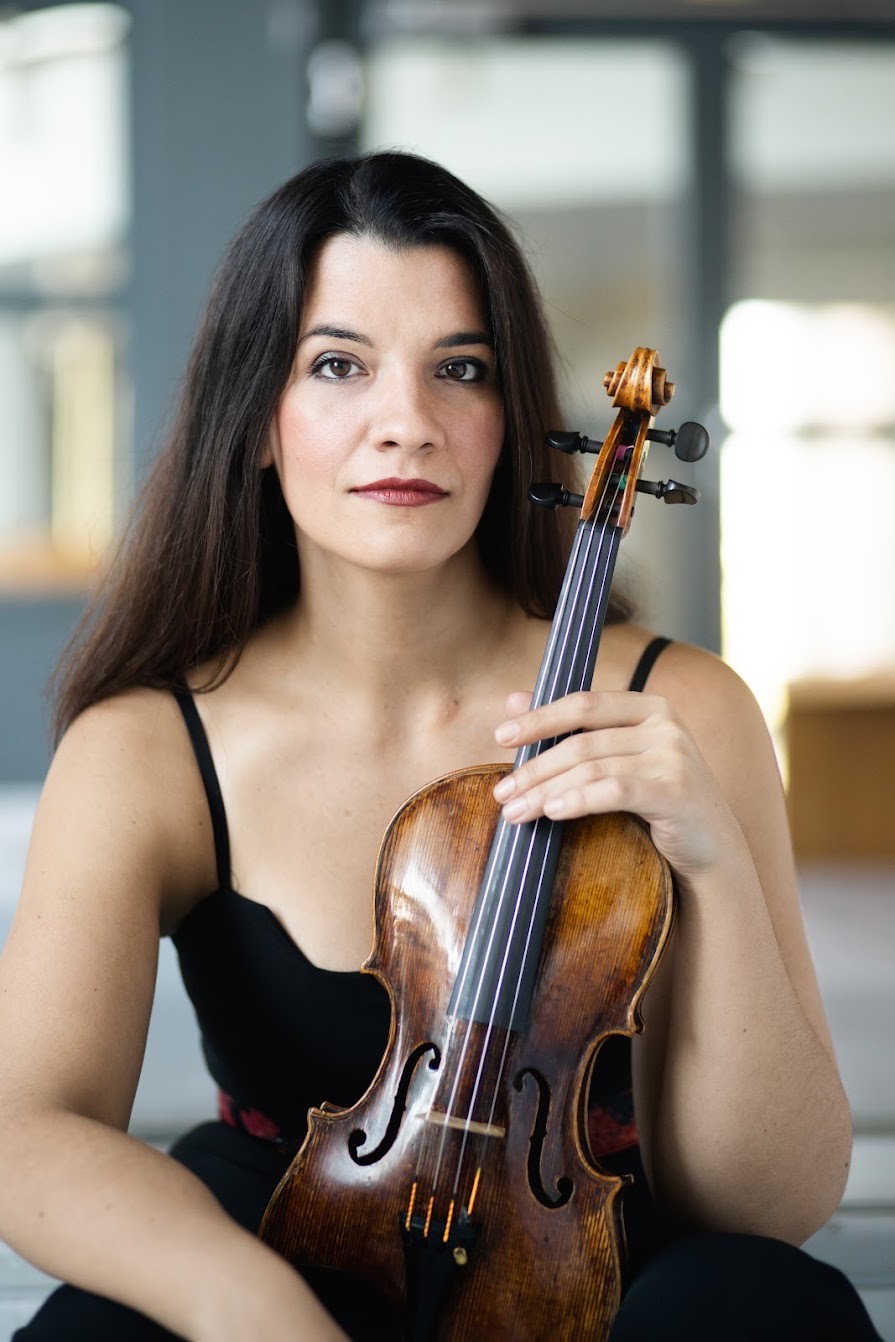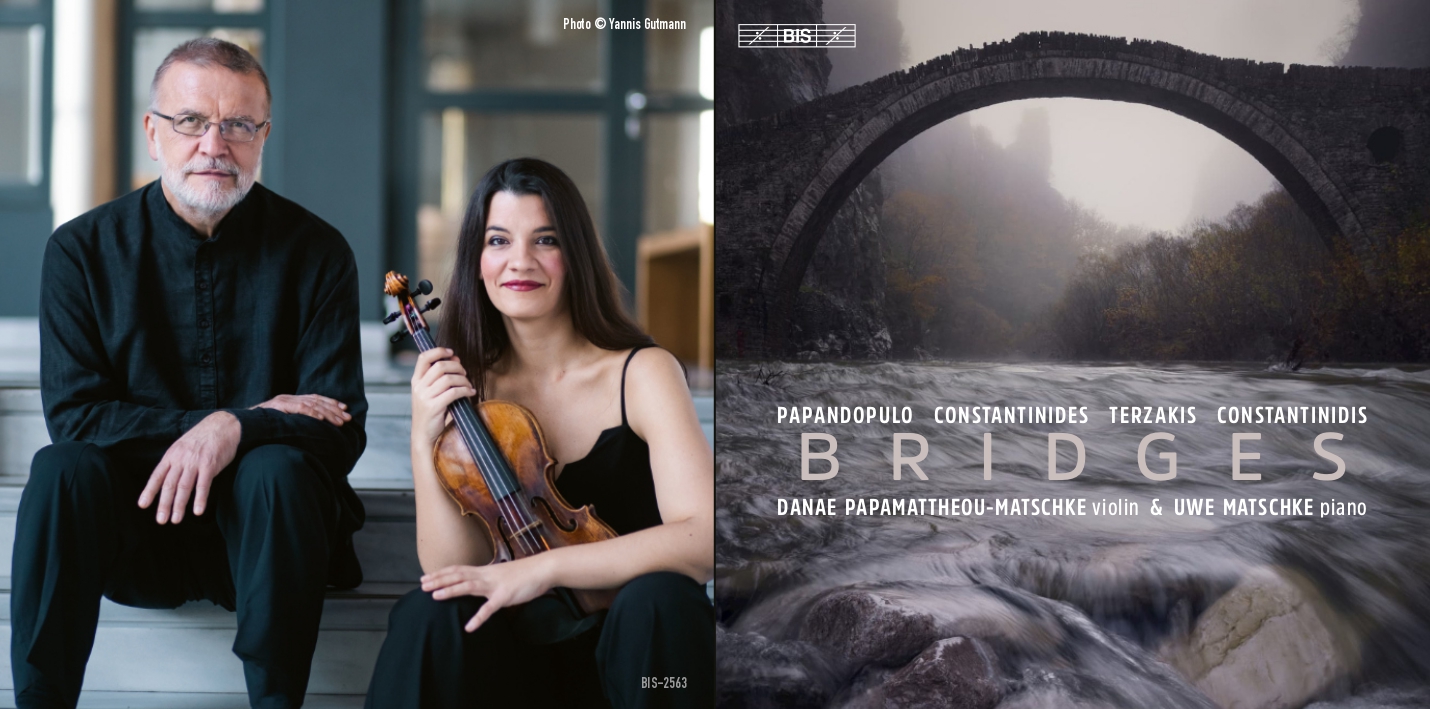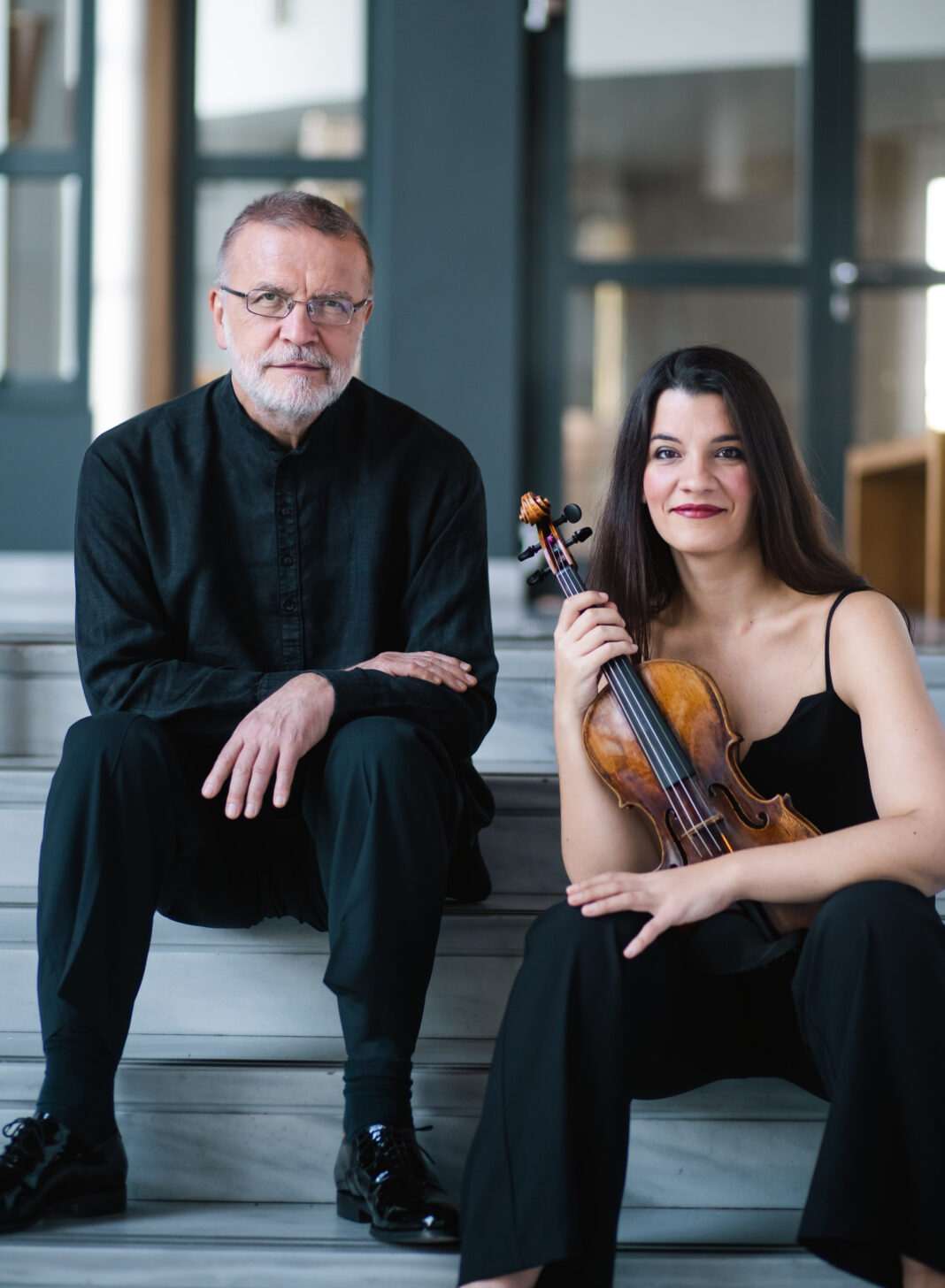By Fotios Kaliampakos*
Greek-German Violinist Danae Papamatthäou-Matschke talks to Hellenic News of America about her experiences in New York and how she first came to play the violin. Here she discusses her newly released CD: “Bridges” with Uwe Matschke, which features works by Boris Papandopulo, Dinos Constadinides, Dimitri Terzakis and Yannis Constantinidis, explores their fascinating musical journeys and highlights their roots.
1. How did you decide to pursue a career or better, a life, in music?
Ever since I can recall memories of my childhood, I remember being surrounded by musical sounds in our house in Athens. Either because of the piano that my father studied and taught, or because of the guitar that my mother played when my brother and I sang children’s songs together. The most decisive stimulus for me to turn to the violin was when, at the age of only three, I heard my father rehearsing with a violinist. I was “overcome by the musical virus” and from then on I didn’t want to do anything else!!! I read somewhere that “you don’t choose the music but it chooses you” …. I would totally agree with that!
2. How did your particular interest in classical music come about? Why violin?
The “why the violin” question I can’t answer. I was a naughty child and it was not easy to sit somewhere quietly. So the first time this happened was at the sound of a violin. A kind of love at first sight, it seems.
My particular interest in classical music can probably be explained by the fact that I believe that no other kind of music can touch me and express my feelings as well as this one. Every time I listen to a favorite piece I realize anew how much power it has and how it seems like magic that it can make people feel so much without a single word.

3. Where did you study? How is your art affected by your Greek and German side?
I grew up in Athens and took my first lessons in my hometown at the age of five. At the age of 13, after passing an entrance examination, I was accepted at the Belvedere Special Music School in Weimar, Germany, where I had the extraordinary opportunity to be in the violin class of Professor Jost Witter, one of the greatest pedagogues to have taught at the Franz Liszt School of Music in Weimar. This probably determined my decision to follow the difficult path of a musical career and to take up the violin seriously. This was followed by studies at the Mozarteum University in Salzburg with Professor Igor Ozim and a soloistic second master’s degree at the Hochschule für Musik und Theater in Hamburg with Professor Tanja Becker Bender. Just recently, I successfully defended my doctoral thesis at the University of Macedonia in Thessaloniki and I expect to be awarded a doctorate in the coming months. For the past 3 years I have also been working as an assistant professor at the Hamburg School of Music and Theatre.
In Greece classical music is not a “tradition” like in Western European countries and therefore a musician in this, anyway, difficult field does not have the same opportunities as in Germany to promote and develop his work. I decided to settle in Hamburg but always having my “home” in Greece.
Because of this change in my life, I was now constantly confronted with two cultures (Greek-German), I had to learn to observe, reflect and understand fundamental differences of these two.
After many years of living in two countries, one adopts qualities (or idiosyncrasies) of both cultures and these in turn shape the person one is. Qualities such as, for example, ‘German’ consistency and determination or, on the other hand, ‘Greek’ cordiality or humor.
All these factors and experiences naturally influence an artist and the way he or she plays. Ultimately, however, I couldn’t name which aspects specifically influence what, because it has evolved into a kind of hybrid. One identity cannot exist in me without the other.
You can only accept both with gratitude and draw inspiration from both.
4. What is your creative process? How do you approach a work new to you and how a new (contemporary) work?
I think the important thing in dealing with any work, regardless of when it was written, is that the performer should be able to understand it in depth and be able to interpret it in his own unique way. In addition to playing the right notes, there must be an understanding of the structure of the work and the time in which it was written. Then one’s imagination does the important work … There are many subjective factors that lead the performer to create his or her own personal interpretation.
5. Is there room for innovation when playing a piece like a Beethoven sonata, something that so many interpreters have approach before? What is the meaning of playing the great works of the past for an artist? For the audience?
There is always room for innovation, regardless of the work or the composer or how often it has been performed. Since each artist is different, once they make a work “their own”, they have something different to say, thus creating for the audience a different and perhaps exciting new approach to a work they already know. The fact that some works are much loved and often performed by many performers, highlights in the best way the uniqueness of each and his right to a new interpretive approach and point of view. Exactly the same is true in the other performing arts. Can we think, for example, that in the interpretation of works by the ancient Greek tragedians or Shakespeare there is interpretive saturation?
What I would simply like to see a little more of (although there are very good efforts being made, at least here in Germany) is in the inclusion of more unknown – but equally remarkable – works in the repertoire of classical music halls.

6. What are your latest performances/recordings and what are your future plans?
My last recording was made just a few months ago in collaboration with BIS Records and my partner pianist and father Uwe Matschke. We had the great pleasure of recording works by Greek and Greek-born composers of the diaspora in the wonderful Sendesaal in Bremen, a hall with amazing acoustics, where numerous recordings of many important artists have been made. This CD will be released on June 2nd and includes among others some premiere world recordings of works. I have always been interested in the work of Greek composers and I am very happy that this production could be made with the financial support of some of the most important foundations in Germany as well as dear philanthropists who recognized the value of this project.
My upcoming appearances this year will include summer music festivals in Austria and Germany, an appearance at the wonderful Elbphilharmonie in Hamburg, a collaboration with the Athens State Orchestra, as well as a focus on the work and extraordinary musical personality of composer G. Ligeti, who is being honored at festivals here in Hamburg as a former professor of the University.
7. You performed in New York before. Tell us more about that experience.
My appearance and journey to New York the year before the pandemic is an experience I will always remember. A music-loving gentleman who had heard me in Greece invited me for a concert because he liked my playing so much. It has always been a dream of mine to travel so far and be able to visit this spectacular city that I only knew through cinema.
I was also lucky enough to stay a few extra days after my performance, meeting people and taking long walks around the familiar parts of the city.
I hope to get the chance to be there again soon, as unfortunately the plan to travel to the US for concerts and Masterclasses in 2021 could not be realized due to the pandemic…
What I will never forget and will always remember as the biggest difference I felt between the US and Europe is the endless positivity of the people there! Everywhere I went I drew positive energy and passion for what I do and who I am. People everywhere were very open and welcoming. I don’t want to claim that this kind of attitude doesn’t exist in Germany for example where I live, but in New York you don’t have to know someone to say hello or a kind word to them. A beautiful difference in mentality.
8. You live in Hamburg, a city that has been a center of classical music for centuries, but you perform also in places like Lesbos, Hydra among many others. Is there a difference for the “function” of music between these places?
I don’t think there is much difference in the “function” of the music. I have the same pleasure of playing in a small cultural center in the Greek countryside or in the Elbphilharmonie in Hamburg. People everywhere, as long as they keep their mental and intellectual horizons open, are just as willing to receive the “divine” gift of music.
A phenomenon that I think we can all observe and admit is that culture is going through a global crisis and almost all institutions are having terrible problems to survive, whether they are in urban centers or small provincial towns. It is therefore the duty of artists, but also the need for the survival of their Art, to educate the next generations so that they can sense that without the arts the world will slide into a new Middle Ages of barbarism and the values of humanism bequeathed to us by the Renaissance will recede if not disappear altogether. It must be understood that the work of an artist is not a “hobby” or “luck that one is born with talent”. No, it is above all dedication and hard work. It is a constant need to search for the truth about something that transcends words.
*Fotios Kaliampakos is a member of the Music Critics Association of North America (MCANA).







